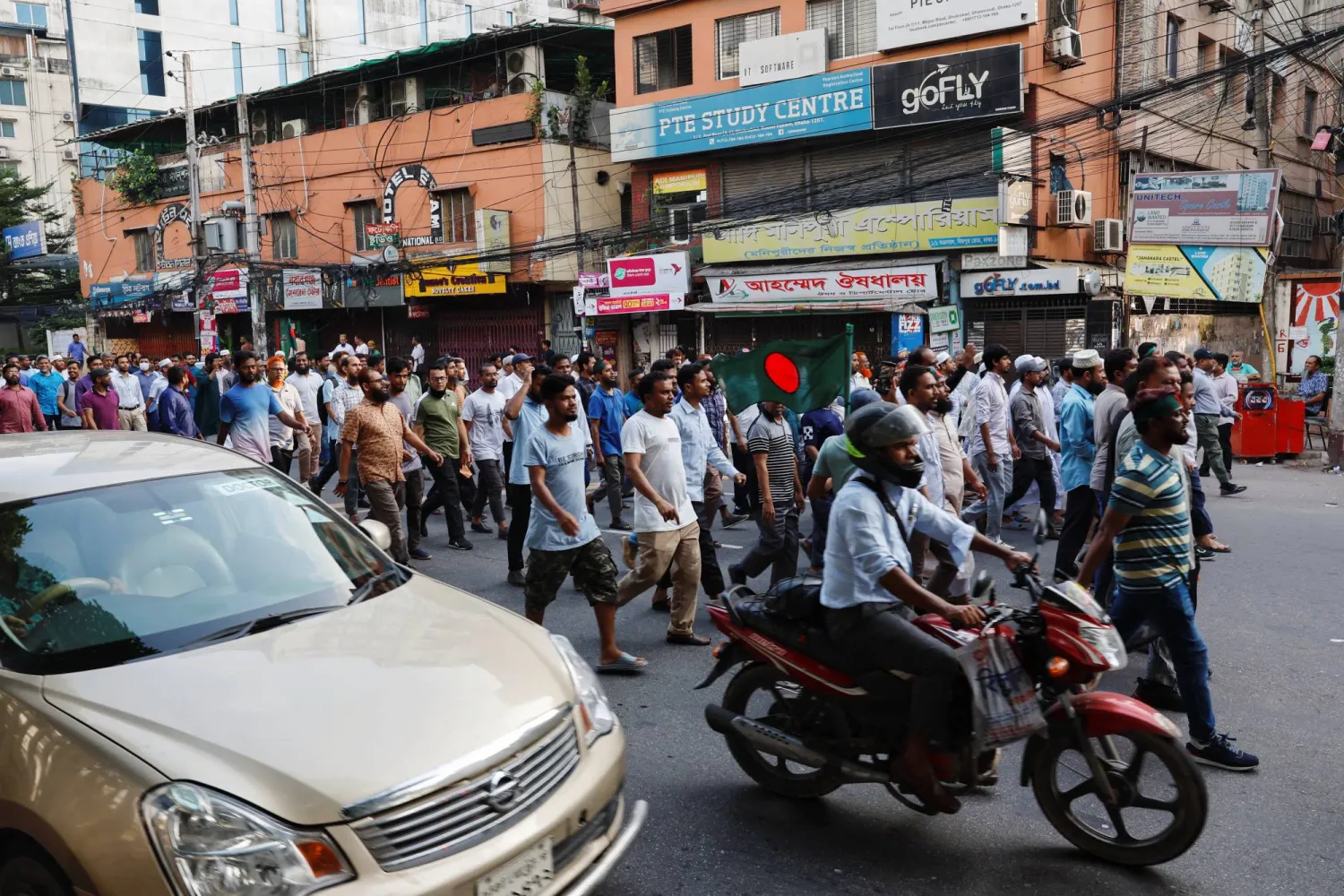Hundreds of student protesters and political activists in Bangladesh, armed with bamboo sticks, iron rods and pipes, on Thursday, assaulted supporters of the ousted Prime Minister Sheikh Hasina and prevented them from reaching the previous house of her father and assassinated independence leader Sheikh Mujibur Rahman in the capital.
The house in Dhaka’s Dhanmondi area was turned into a museum to showcase narratives and other objects about a military coup on Aug. 15, 1975, when Rahman was assassinated along with most of his family members. The house, now called Bangabandhu Memorial Museum, was torched by the protesters hours after Hasina’s downfall on Aug. 5 following an uprising during which more than three hundred people were killed, The Associated Press said.
Thursday is the anniversary of Rahman’s death, and Hasina, now self-exiled in India, urged her supporters to commemorate the day by paying respect to Rahman. Previously, Aug. 15 was a public holiday and was observed as a national mourning day by Hasina’s administration. But that has been canceled by an interim government led by Nobel laureate Muhammad Yunus following the ouster of Hasina, who survived in 1975 along with her younger sister because they were visiting Germany in 1975.
On Thursday, the protesters attacked Hasina’s supporters who attempted to get to the site. They manhandled many and checked the visitors’ phones and identity cards while threatening journalists for filming the incidents at the scene, witnesses said.
Another group of protesters on Thursday marched through streets in the area where the museum site remained blocked with barbed-wire fences.
The protesters, who arrived at Rahman's house first on Wednesday, attacked a prominent actress, as she along with dozens of Hasina’s supporters reached there to light candles as part of the commemoration.
Overnight, they held a party using loudspeakers and playing songs as they danced outside the museum, which was set on fire during the anti-government demonstrations earlier this month. Videos of the party went viral on social media.
The protesters said they were out to stop the gathering of Hasina’s supporters as they could attempt to create chaos in the name of commemoration.
Sarjis Alam, a key organizer of the student protests, said Thursday that they would continue to demand the trial of Hasina as he led a rally in Dhaka's Shahbagh area.
Asked about the harassment of journalists by the students and other activists outside the museum, he said he would inquire about that but gave no details.
In the past, big gatherings took place on the premises of the museum, seen by many as a source of inspiration.
Hasina had asked supporters earlier this week to “pray for the salvation of all souls by offering floral garlands and praying” outside the museum, in her first public statement since her fall.
With no police in sight, the chaos remained in Bangladesh's capital throughout Thursday.
Sam Jahan, a video journalist for Reuters, protested against the harassment by the protesters, in a Facebook post.
“It is fair enough what you, the political activists, student protesters want to achieve, politically. But when you try to stop my rolling camera, resisting the freedom of the press and when you manhandle my colleagues, I will speak up,” Jahan wrote in the post.
The country's leading English-language Daily Star newspaper reported that their journalists faced trouble at the scene, and they were forced to delete photos and videos.
Mujib Mashal, South Asian bureau chief of The New York Times, in a video post on social media platform X said that it was a “complete mob rule.”
“The victims of yesterday are perpetrators of today; men armed with clubs and pipes (many identified themselves as BNP and Jamaat) thrashing and chasing away anyone they suspect of being Awami League,” he said.
The protesters have been demanding trial of Hasina for the killings during weeks-long violence and cases have already been filed against her and other close party colleagues and top police officials.
More than 300 people were killed in unrest that started in July with protests against a quota system for government jobs that later morphed into a movement against what was considered Hasina’s increasingly autocratic administration. The uprising eventually forced Hasina to leave office and flee to India, ending her 15-year rule.
Yunus took over as the interim leader. Sixteen people, including two student protest leaders and others, drawn mainly from civil society, have been included in the interim Cabinet.
He chose the new Cabinet members after talks between student leaders, civil society representatives and the military.
Bangladeshi Protesters Attack Supporters of Ex-Premier Hasina and Harass Journalists

Protesters march on the street of Dhanmondi in front of Bangabandhu Sheikh Mujibur Rahman Memorial Museum in Dhaka, Bangladesh, August 15, 2024. REUTERS/Mohammad Ponir Hossain

Bangladeshi Protesters Attack Supporters of Ex-Premier Hasina and Harass Journalists

Protesters march on the street of Dhanmondi in front of Bangabandhu Sheikh Mujibur Rahman Memorial Museum in Dhaka, Bangladesh, August 15, 2024. REUTERS/Mohammad Ponir Hossain
لم تشترك بعد
انشئ حساباً خاصاً بك لتحصل على أخبار مخصصة لك ولتتمتع بخاصية حفظ المقالات وتتلقى نشراتنا البريدية المتنوعة







